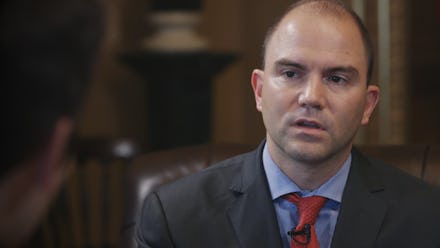Top White House Adviser Ben Rhodes Breaks Down the Importance of the Iran Deal

The Obama administration has spent this week vigorously defending the agreement between Iran and six world powers that will drastically limit Iran's nuclear program in exchange for relief from crippling sanctions. Critics have alleged that the deal would lead to a windfall for the Iranian regime, while not going far enough to ensure that the country is prevented from developing nuclear weapons in the future.
In a wide-ranging conversation with Mic in a stately meeting room in the Eisenhower Executive Office Building across the street from the White House, deputy national security adviser Ben Rhodes strongly defended the deal with Iran, saying that the deal "removes the type of threat that would shape the global security picture for many years to come."
In response to questions from Mic editor-in-chief Jake Horowitz and Mic readers, Rhodes laid out what the deal means for young people in the United States and the Middle East, hit back at critics who have blasted the deal in recent days and argued that a future Republican president would be under pressure to keep the deal in place.
Watch the highlights from our conversation here:
The critics: Rhodes addressed two main areas of criticism: that Iran would use newly available revenue to increase funding for terrorist groups in the region, and that the agreement will further embolden Iranian hardliners in the regime to suppress dissent and crack down on dissidents, particularly young Iranians who make up the overwhelming majority of the country's population.
Rhodes conceded that the increased revenue Iran will see as a result of sanctions being lifted were a legitimate concern, but said that argument suggests that negotiations should never have occurred.
"The most legitimate concern is less about the deal and more about the decision to do the deal in the first place," Rhodes said. "They will have more money, there's no question about it. ... But the fundamental decision here is, what's more dangerous? Iran not being checked in terms of producing a nuclear weapon, or Iran getting sanctions removed? The sanctions were put in place to get this deal. That's why the world signed up for them."
In an interview with Mic on Wednesday, Republican presidential candidate Sen. Lindsey Graham of South Carolina, one of the most vocal critics of the deal, argued that the agreement would lead to further isolation for the country's young people: "I think what you've done to young people in Iran is empowered their oppressor. The chance of change coming to Iran is now a lot less."
Asked about Graham's claim, Rhodes said that the deal "holds out greater hope" for young Iranians by relieving the nuclear-related sanctions that have strangled the economy. He argued that the deal actually empowers the moderate elements of the Iranian leadership, who stand to benefit from greater economic freedom and ties with the West.
"What we saw throughout this negotiation, and what was evident through public statements, was that the hardliners in Iran actually opposed this deal," Rhodes said. "They've been very comfortable in the status quo, where essentially large chunks of Iranian society were suffering under sanctions. ... Frankly, the people who stand to benefit in Iran because of this deal are far more likely to be the Iranian middle class, young people and the Iranian economy itself."
Can the deal survive a Republican president? One of the most hotly debated aspects of the nuclear deal is whether a Republican president could roll back the agreement if elected in 2016. The deal is not a treaty, so a future president could unilaterally pull out of the agreement's obligations, but Rhodes said that any future president would be under enormous pressure to continue to comply with the terms.
"The notion that they would immediately want to essentially precipitate a crisis by pulling out of this deal, I think would be very difficult." Rhodes said. "The Iranians would say, 'OK, we're putting the centrifuges back in. We're going to start reacquiring the stockpile.' Not only would you lose that, but again, the rest of the world would say, 'Whoa, the Americans just broke the deal. And we're not going to go along with sanctions when you guys just pulled out of the deal.' Someone could do that, but it wouldn't be a very good decision."
As for whether the nuclear deal will lead to a further opening of Iran to the West, Rhodes couldn't say.
"The question that many people ask is, do you think that is going to change Iran? Is Iran going to evolve?" Rhodes said. "The answer is, we don't know."